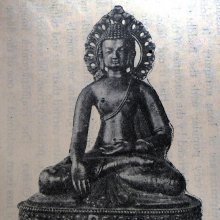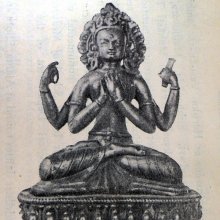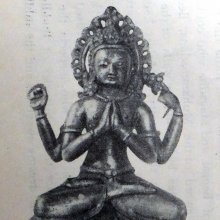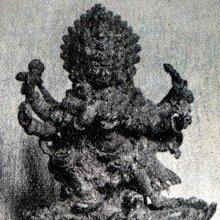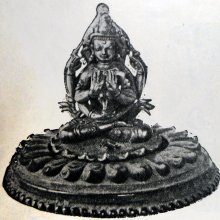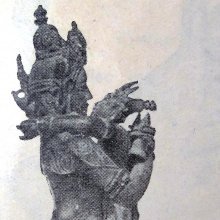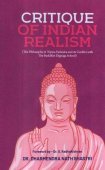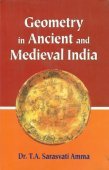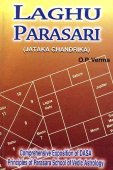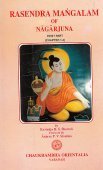Pandita, Paṇḍita, Paṇḍit, Paṇḍitā, Pandit: 32 definitions
Introduction:
Pandita means something in Buddhism, Pali, Hinduism, Sanskrit, Jainism, Prakrit, the history of ancient India, Marathi, Hindi. If you want to know the exact meaning, history, etymology or English translation of this term then check out the descriptions on this page. Add your comment or reference to a book if you want to contribute to this summary article.
Pandita has 30 English definitions available.
Images (photo gallery)
(+7 more images available)
Languages of India and abroad
Sanskrit dictionary
[Deutsch Wörterbuch]
Source: Cologne Digital Sanskrit Dictionaries: Böhtlingk and Roth Grosses Petersburger WörterbuchPaṇḍita (पण्डित):—(angeblich von paṇḍā) gaṇa tārakādi zu [Pāṇini’s acht Bücher 5, 2, 36.]
1) adj. (f. ā) wird mit kṛtādi compon. gaṇa śreṇyādi zu [Pāṇini’s acht Bücher 2, 1, 59.] behält im comp. vor Eigenschaftwörtern seinen Ton gaṇa spaṣṭādi zu [Pāṇini’s acht Bücher 6, 2, 24.] unterrichtet, klug; subst. ein unterrichteter —, kluger —, gelehrter Mann [Amarakoṣa 2. 7, 5. 3, 4, 18, 103.] [Hemacandra’s Abhidhānacintāmaṇi 341.] [Anekārthasaṃgraha 3, 275.] [Medinīkoṣa t. 122.] [Halāyudha 2, 177.] [The Śatapathabrāhmaṇa 14, 6, 4, 1. 9, 4, 16. 17.] [Chāndogyopaniṣad 6, 14, 2.] [KAIVALYOP.] in [Weber’s Indische Studien 2. 11.] paṇḍitā manyamānāḥ (wie [] liest; vgl. auch [Weber’s Indische Studien 1, 288]) sich für klug haltend [Muṇḍakopaniṣad 1, 2, 8. -] [Manu’s Gesetzbuch 7, 109.] [Mahābhārata 3, 62. 5, 990. fgg.] [Harivaṃśa 7876. 8642.] [Suśruta 1, 106, 16.] [Varāhamihira’s Bṛhajjātaka S. 18, 4. 67, 5.] [Rājataraṅgiṇī 4, 490.] [Pañcatantra 72, 12. I, 334.] paṇḍito pi varaṃ śatrurna tu mitramapaṇḍitam [Pañcatantra] in [Weber’s Indische Studien 3, 371.] [Hitopadeśa 7, 12. I, 12.] buddhi 161. mithyā [Kathāsaritsāgara 6, 126.] a [Mahābhārata 6, 1625.] [Suśruta 2, 360, 13.] [Rāmāyaṇa] [Gorresio 2, 7, 2.] [Spr. 507.] jayāpīḍa der kluge Jay. [Rājataraṅgiṇī 4, 488.] in der Bed. sich verstehend auf mit einem im loc. gedachten Begriffe compon. gaṇa śauṇḍādi zu [Pāṇini’s acht Bücher 2, 1, 40.] svārtha [Mahābhārata 1, 5568.] ātmārtha [Harivaṃśa 7909.] madhurālāpanisarga [Kumārasaṃbhava 4, 16.] rati 18. naya [Pañcatantra III, 102.] [Hitopadeśa I, 27.] prajāpīḍana [Rājataraṅgiṇī 5, 164.] buddhi [Rāmāyaṇa 6, 13, 7] ist = buddhyā pa. paṇḍita fehlerhaft für piṇḍita [Vetālapañcaviṃśati] in [Lassen’s Anthologie 15, 8] —
2) m. Nomen proprium eines Mannes, = paṇḍitaka [Mahābhārata 6, 3910. fgg.] eines in eine Gazelle verwandelten Brahmanen [Harivaṃśa 1210.] —
3) m. Weihrauch [Hemacandra’s Anekārthasaṃgraha] [Medinīkoṣa]
--- OR ---
Paṇḍita (पण्डित):—
1) buddhi [Spr. 4793.] — paṇḍita fehlerhaft für piṇḍita; vgl. [Spr. 717. 1953] (auch die ed. Bomb. des [Mahābhārata] paṇḍita). — Vgl. mahā .
Source: Cologne Digital Sanskrit Dictionaries: Sanskrit-Wörterbuch in kürzerer FassungPaṇḍita (पण्डित):——
1) Adj. unterrichtet , klug , sich verstehend auf (im Comp. vorangehend) ; m. ein unterrichteter — , kluger — , gelehrter Mann. —
2) m. — a) *Weihrauch. — b) Nomen proprium verschiedener Männer. — Auch fehlerhaft für piṇḍita.
Sanskrit, also spelled संस्कृतम् (saṃskṛtam), is an ancient language of India commonly seen as the grandmother of the Indo-European language family (even English!). Closely allied with Prakrit and Pali, Sanskrit is more exhaustive in both grammar and terms and has the most extensive collection of literature in the world, greatly surpassing its sister-languages Greek and Latin.
See also (Relevant definitions)
Starts with (+31): Pamditamarana, Pamditaputra, Pamditavara, Pamditavarya, Pandita gadadhara, Pandita jonaka, Pandita maddhaka, Pandita pajaka, Pandita rupadeva kavi, Pandita shribaka, Panditagarva, Panditahladini, Panditai, Panditajatiya, Panditaka, Panditakarabhindipala, Panditakumaraka, Panditamandala, Panditamanika, Panditamanin.
Ends with (+177): Aggadhanuggaha Pandita, Aggapandita, Alalekayipamdita, Alikapandita, Amiracandra pandita, Amrita pandita, Ananda pandita, Ananta pandita, Anarthapandita, Aniruddha pandita, Annaiya pandita, Apandita, Aranyapandita, Asthanapamdita, Atipandita, Avaspandita, Avispandita, Balapandita, Bhanu pandita, Bhanupandita.
Full-text (+1099): Sudhi, Panditamanin, Panditammanya, Shastrin, Ranapandita, Apandita, Surin, Shrautapadarthanirvacana, Vedi, Doshajna, Vibudha, Panditasabha, Vidhanaga, Panditata, Panditiman, Panditamanika, Panditavadin, Panditaka, Jnanaraja, Raja-pandita.
Relevant text
Search found 172 books and stories containing Pandita, Paṇḍita, Paṇḍit, Paṇḍitā, Pandit, Pandut, Paṃḍita, Pamdita; (plurals include: Panditas, Paṇḍitas, Paṇḍits, Paṇḍitās, Pandits, Panduts, Paṃḍitas, Pamditas). You can also click to the full overview containing English textual excerpts. Below are direct links for the most relevant articles:
Jivanandana of Anandaraya Makhin (Study) (by G. D. Jayalakshmi)
The Need for Present Study < [Chapter 1 - Allegorical Plays in Sanskrit Literature]
Family of Ānandarāya Makhin < [Chapter 2 - Author, His Life and Works]
Shrimad Bhagavad-gita (by Narayana Gosvami)
Verse 4.19 < [Chapter 4 - Jñāna-Yoga (Yoga through Transcendental Knowledge)]
Verse 5.4 < [Chapter 5 - Karma-sannyāsa-yoga (Yoga through Renunciation of Action)]
Verse 5.18 < [Chapter 5 - Karma-sannyāsa-yoga (Yoga through Renunciation of Action)]
Dhammapada (Illustrated) (by Ven. Weagoda Sarada Maha Thero)
Verse 80 - The Story of Novice Monk Paṇḍita < [Chapter 6 - Paṇḍita Vagga (The Wise)]
Verse 76 - The Story of Venerable Rādha < [Chapter 6 - Paṇḍita Vagga (The Wise)]
Verse 65 - The Story of Thirty Monks from Pāṭheyyaka < [Chapter 5 - Bāla Vagga (Fools)]
Garga Samhita (English) (by Danavir Goswami)
Verse 4.1.48 < [Chapter 1 - The Story of the Personified Vedas]
Verse 8.13.88 < [Chapter 13 - A Thousand Names of Lord Balarāma]
Verses 4.19.132-133 < [Chapter 19 - A Thousand Names of Srī Yamunā]
Formal Education System in Ancient India (by Sushmita Nath)
The 8th century Vikramaśilā Mahāvihāra < [Chapter 3 - Centres of Learning in Vedic and Buddhist Period]
The Chatuspathi (Catuṣpāṭhī Tol) type of School < [Chapter 3 - Centres of Learning in Vedic and Buddhist Period]
Education in the Epic Period < [Chapter 1 - Introduction]
Bhagavatpadabhyudaya by Lakshmana Suri (study) (by Lathika M. P.)
Biographical Sketch of Lakṣmaṇa Sūrin < [Chapter 1 - Life and Works of Lakṣmaṇa Sūrin]
Mahākāvyās on Great heroes of Independence struggle < [Chapter 1 - Life and Works of Lakṣmaṇa Sūrin]
Related products
(+4 more products available)
